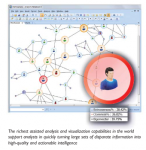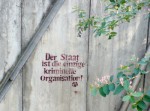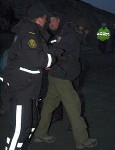Browse: Page 47
By europolice on 19. Mai 2011
 By Kim Zetter
By Kim Zetter
Kathy Thomas knew she was under surveillance. The animal rights and environmental activist had been trailed daily by cops over several months, and had even been stopped on occasion by police and FBI agents.
But when the surveillance seemed to halt suddenly in mid-2005 after she confronted one of the agents, she thought it was all over. Months went by without a peep from the FBI surveillance teams that had been tracking her in undercover vehicles and helicopters. That’s when it occurred to her to check her car.
Rumors had been swirling among activists that the FBI might be using GPS to track them — two activists in Colorado discovered mysterious devices attached to their car bumpers in 2003 — so Thomas (a pseudonym) went out to the vehicle in a frenzy and ran her hands beneath the rear bumper. She was only half-surprised to find a small electronic device and foot-long battery wand secured to her metal fender with industrial-strength magnets. (more on wired.com)
Posted in English, European Police, Software/ IT
By europolice on 17. Mai 2011
 The Internet is the place where we meet, speak, create, educate ourselves and organize. However, as we are at a turning point in early web history, it could either become a prime tool for improving our societies, knowledge and culture, or a totalitarian tool of suveillance and control.
The Internet is the place where we meet, speak, create, educate ourselves and organize. However, as we are at a turning point in early web history, it could either become a prime tool for improving our societies, knowledge and culture, or a totalitarian tool of suveillance and control.
After 15 years of fighting the sharing of culture in the name of an obsolete copyright regime, governments of the World are uniting to control and censor the Internet. The black-out of the Egyptian Net, the US government’s reaction to Wikileaks, the adoption of website blocking mechanisms in Europe, or the plans for “Internet kill switches”[1] are all major threats on our freedom of expression and communication. These threats come from corporations and politicians, unsettled by the advent of the Internet.
As a host of the G8, France’s president Nicolas Sarkozy wants to step up centralized control over the Internet. He has convened world leaders to a summit aimed at working towards a “civilized Internet”, a concept he borrowed from the Chinese government. By creating fears such as “cyber-terrorism”, their objective is to generalize rules of exception in order to establish censorship and control, thereby undermining free speech and other civil liberties. Continue reading „G8 vs INTERNET: Call for creative action“
Posted in English, Software/ IT, Was tun?
By europolice on 16. Mai 2011
 INDECT participated in EUROPOLTECH 2011, the International Fair of Technology and Equipment for the Police and National Security Services which took place on April 13–15, 2011.
INDECT participated in EUROPOLTECH 2011, the International Fair of Technology and Equipment for the Police and National Security Services which took place on April 13–15, 2011.
All major manufacturers of modern equipment and world-class system solutions for police services were present at the Fair and the Conference. A number of security related business companies from countries such as Bulgaria, Germany, Italy, Spain and the United Kingdom were present at the event. Among the distinguished speakers were Jerzy Buzek, the President of the European Parliament; Khoen Liem, EU Enterprise and Industry Directorate General; Krzysztof Kurzydłowski, Director of the Polish National Centre for Research and Development; Allan Pratt, Director of the Science, Engineering and Technology UK Home Office; Thorsten Fischer, Representative of the Federal Ministry of Education and Research, Germany; Dimitar Zdravkov Georgiev, Bulgarian Deputy Minister of Interior. The Main project work groups were represented at the Fair. Additionally, Professor Andrzej Dziech, INDECT Coordinator gave a presentation at the Police Conference “Science and Innovation vs. the Security System”. Continue reading „INDECT at EUROPOLTECH 2011“
Posted in English, European Police, Forschung, Software/ IT
By europolice on 13. Mai 2011
 Matthias Monroy
Matthias Monroy
Polizeien zahlreicher Länder organisieren ihren Austausch verdeckter Ermittler bereits seit 2001. Deutschland hat grundlegende informelle Strukturen mitgestaltet
Nachdem die Bundesregierung vor wenigen Wochen mit der nichtssagenden Antwort auf eine parlamentarischen Initiative zum „Einsatz verdeckter Ermittlerinnen und Ermittler sowie Vertrauenspersonen im innerstaatlichen, europäischen bzw. internationalen Kontext“ aufwartete, kommt jetzt immerhin etwas Licht in die immer noch nebulöse grenzüberschreitende Spitzelzusammenarbeit: In ihrer gut zwei Monate dauernden Bearbeitung der Anfrage „Internationaler Austausch verdeckter Ermittlerinnen und Ermittler und Vertrauenspersonen“ wird erläutert, wie sich Polizeien der EU-Mitgliedsstaaten grenzüberschreitend zur gemeinsamen Spitzelei verabreden.
Die innerhalb der EU weit fortgeschrittene grenzüberschreitende Polizeizusammenarbeit basiert bislang unter anderem auf dem Übereinkommen über die Rechtshilfe in Strafsachen (EU-Rh-Übk), das der EU-Ministerrat vor zehn Jahren angenommen hatte.
Ein Abkommen zwischen der Bundesrepublik Deutschland und den USA über die Rechtshilfe in Strafsachen enthält ebenfalls eine entsprechende, allgemeine Formulierung. Trotzdem bleiben zahlreiche Regelungen offen. Deshalb startete die deutsche EU-Präsidentschaft 2007 eine Initiative, um „rechtliche und tatsächliche Probleme“ des internationalen Spitzeltauschs aus dem Weg zu räumen. Anvisiert waren nach einer Problemanalyse EU-weite gesetzgeberische Maßnahmen. Den Auftrag zur Ausarbeitung einer Entschließung des Rates hatte die frühere „Multidisziplinäre Gruppe Organisierte Kriminalität“ erhalten, die jetzt in der „Arbeitsgruppe Allgemeine Angelegenheiten und Evaluationen“ aufgegangen ist. (weiter auf heise.de)
Posted in BKA, European Police, Europol, Justiz, Policing Major Events
By europolice on 12. Mai 2011
 »Perfektes Beispiel für die Zusammenarbeit zwischen Wissenschaft und Praxis«. Die Uni Göttingen hat das Fingerabdruck-Identifikationssystem des Bundeskriminalamts optimiert
»Perfektes Beispiel für die Zusammenarbeit zwischen Wissenschaft und Praxis«. Die Uni Göttingen hat das Fingerabdruck-Identifikationssystem des Bundeskriminalamts optimiert
Von Reimar Paul
In einer speziellen Datei, dem »Automatischen Fingerabdruck-Identifikationssystem« (AFIS) speichert das Bundeskriminalamt (BKA) die Fingerabdrücke von mehr als drei Millionen Menschen. Verdächtigen solche Abdrücke abzunehmen und sie mit »Prints« am Tatort oder in der genannten Datei abzugleichen, gilt der Polizei – neben dem sogenannten genetischen Fingerdruck – als Mittel der Wahl bei kriminalistischen und politischen Ermittlungen. Das AFIS wird seit Dezember 1993 genutzt. (weiter auf jungewelt.de)
Posted in Biometrie, BKA, Border Control, Datenbanken
By europolice on 11. Mai 2011
 Geotime software, bought by the Met, collates data from social networking sites, satnavs, mobiles and financial transactions
Geotime software, bought by the Met, collates data from social networking sites, satnavs, mobiles and financial transactions
Britain’s largest police force is using software that can map nearly every move suspects and their associates make in the digital world, prompting an outcry from civil liberties groups.
The Metropolitan police has bought Geotime, a security programme used by the US military, which shows an individual’s movements and communications with other people on a three-dimensional graphic. It can be used to collate information gathered from social networking sites, satellite navigation equipment, mobile phones, financial transactions and IP network logs. (more on guardian.co.uk)
Posted in Datenbanken, English, European Police, Software/ IT
By europolice on 10. Mai 2011
 „Mitras“ (Migration, Traffic and Security) was the hungarian one-week-operation against „illegal migration“ and organised as a follow-up of „Hermes“ (that was ruled by belgian presidency last year). The operation in the end of April was carried out by 22 Member States. The aim was to analyse „main flows of illegal immigration“ on the main transport routes within the Schengen Area and „strengthening the fight against the illegal immigration and the related illegal activities“ inside the Schengen Area. „Mitras“ wants to help the developping of a „frequent evaluation system“ regarding „illegal migration“. The focus would be Schengen borders but also external borders.
„Mitras“ (Migration, Traffic and Security) was the hungarian one-week-operation against „illegal migration“ and organised as a follow-up of „Hermes“ (that was ruled by belgian presidency last year). The operation in the end of April was carried out by 22 Member States. The aim was to analyse „main flows of illegal immigration“ on the main transport routes within the Schengen Area and „strengthening the fight against the illegal immigration and the related illegal activities“ inside the Schengen Area. „Mitras“ wants to help the developping of a „frequent evaluation system“ regarding „illegal migration“. The focus would be Schengen borders but also external borders.
1838 „illicit residencies“ were found along the main transport routes (roads, railway, air). Frontex was part of the mission, what clearly violates ist own responsabilities only for external borders. Continue reading „Details about the hungarian „Mitras“-operation“
Posted in Border Control, English
By europolice on 10. Mai 2011
By Alexander Bratersky
Riot police roughly broke up a protest over the destruction of the Khimki forest, briefly detaining two dozen activists and beating one so badly that he required hospitalization, environmentalists said.
About 200 people gathered in the town of Khimki on Sunday for an unsanctioned rally over the centuries-old Moscow region forest, part of which is slated for destruction to make way for an $8 billion highway, Interfax reported.
Among those detained were Left Front leader Sergei Udaltsov, Yabloko party leader Sergei Mitrokhin and environmental champion Yevgenia Chirikova, all of whom reported physical and verbal abuse by police officers. Continue reading „2 Dozen Khimki Defenders Detained“
Posted in English, European Police
By europolice on 9. Mai 2011
 Exclusive: Boat trying to reach Lampedusa was left to drift in Mediterranean for 16 days, despite alarm being raised
Exclusive: Boat trying to reach Lampedusa was left to drift in Mediterranean for 16 days, despite alarm being raised
Jack Shenker in Lampedusa
Dozens of African migrants were left to die in the Mediterranean after a number of European and Nato military units apparently ignored their cries for help, the Guardian has learned.
A boat carrying 72 passengers, including several women, young children and political refugees, ran into trouble in late March after leaving Tripoli for the Italian island of Lampedusa. Despite alarms being raised with the Italian coastguard and the boat making contact with a military helicopter and a Nato warship, no rescue effort was attempted. (more on guardian.co.uk)
Posted in Various
By europolice on 9. Mai 2011
 Interior ministers from the powerful Group of Eight (G8) nations begin meetings Monday in Paris to discuss the important issue of drug trafficking, specifically trafficking of cocaine across the Atlantic Ocean.
Interior ministers from the powerful Group of Eight (G8) nations begin meetings Monday in Paris to discuss the important issue of drug trafficking, specifically trafficking of cocaine across the Atlantic Ocean.
The two-day meeting is being presided over by French Interior Minister Claude Gueant, as France currently holds the rotating G8 presidency, official sources said.
French President Nicolas Sarkozy will meet with participants on Monday evening, his office announced here.
Justice Ministers from several nations are also expected to attend the talks and several non-G8 participants will also be present, organizers said.
These will include representatives from Latin America and the Caribbean, which are focal points for cocaine production and transport to the United States, Europe and elsewhere. Continue reading „G8 Interior Ministers begin meeting Monday in Paris“
Posted in English, European Police
By europolice on 5. Mai 2011
 Seit 2000 werden sämtlichen Informationen über Terroristen in einer Datenbank zusammengetragen, die ihren Ursprung in Österreich hatte. 300 Geheimdienste weltweit haben einen Zugang zu dieser größten privaten terroristischen Datensammlung, mit der – so die Betreiber – Attentate verhindert werden.
Seit 2000 werden sämtlichen Informationen über Terroristen in einer Datenbank zusammengetragen, die ihren Ursprung in Österreich hatte. 300 Geheimdienste weltweit haben einen Zugang zu dieser größten privaten terroristischen Datensammlung, mit der – so die Betreiber – Attentate verhindert werden.
Es waren lange Tage und lange Nächte für John Solomon, doch es werden noch längere Tage und Nächte folgen, denn nun ist seine Arbeit und die seines etwa 450-köpfigen Experten-Teams gefragt. Solomon verwaltet die größte private Terroristen-Datenbank und die ist, da nach dem Tod Osama bin Ladens Vergeltungsschläge befürchtet werden, eine der heißesten Informationsquellen der Antiterror-Experten.
Umfassende Sammlung
15 der 21 Drahtzieher der Terroranschläge des 11. September 2001 waren darin gespeichert, zwei der Hauptverantwortlichen der Attentate auf die Londoner U-Bahn und auch der Hauptverdächtige der Madrider Anschläge. Alle diese Informationen waren schon vor den Attentaten in dieser Datenbank abrufbar, die sich World-Check nennt. Im Jahr von 9/11 ging „World-Check“ online, die Firmenzentrale wurde in London errichtet, die World-Check-Server standen in der Wiener Innenstadt. Zehn Jahre später ist das Service eines der am meisten gefragten bei Banken, Polizei und Geheimdiensten, finden sich doch fast eine halbe Million Menschen in der Datenbank – Mitglieder der Organisierten Kriminalität genauso wie so genannte PEPs (Political Exposed Persons). Zu dieser Gruppe gehören unter anderem Politiker und deren Angehörige aus dem Nahen Osten oder Afrika, deren Geldflüsse nicht immer nachvollziehbar sind. (weiter auf futurezone.at)
Posted in Datenbanken, European Police, Software/ IT
By europolice on 5. Mai 2011
Greece rejects a backtrack in EU’s Schengen free passport zone treaty through the reinstatement of border controls within member countries, said Greek Citizen Protection Minister Christos Papoutsis on Wednesday.
„The combat against illegal migration is a European matter. Greece will not agree in any case to a backtrack in the EU Schengen treaty. But we will support the boost of controls in internal borders under special circumstances,“ said Papoutsis.
The statement was made as a reply to the EU Commission’s proposal for the temporary reintroduction of border controls at the national borders of the Schengen zone, if European experts conclude that a member state cannot address successfully the influx of illegal immigrants. (more on english.people.com)
Posted in Border Control, English
By europolice on 4. Mai 2011
 By NATHAN HODGE
By NATHAN HODGE
The raid on Osama bin Laden’s compound in Pakistan represents probably the biggest success so far of what the military calls „persistent surveillance,“ the ability to relay vast amounts of digital imagery through the unblinking eye of robotic aircraft or other spy gear.
Details about the surveillance equipment that may have been hovering overhead, or carried on the ground by Navy commandos, remain undisclosed. But former military officials said the elaborately scripted raid showed how the military has honed the ability to map the „pattern of life“ of terrorist networks by rewinding through massive amounts of video shot over extended periods of time, in addition to tapping other sources of intelligence.
„That’s the real game-changer here,“ said retired Maj. Gen. Charles Dunlap, a former Air Force judge advocate general, referring to the tools of long-term surveillance, paired with precision weaponry. „Those capabilities not only resulted in the killing of bin Laden, but also forced him to be virtually incommunicado for years.“ (more on wsj.com)
Posted in Drohnen, English, Militaer
By europolice on 4. Mai 2011
 Von Matthias Kremp
Von Matthias Kremp
Satellitenüberwachung, Drohnen und mobile Biometrie: Um Qaida-Chef Bin Laden zu finden und seine Leiche zu identifizieren, benutzten die USA ein ganzes Arsenal modernster Technik. Der Einsatz verdeutlicht das große Potential der Hightech-Kriegsgeräte – aber auch ihre Schwächen.
Zu der Spezialeinheit, die Bin Laden aufspürte und erschoss, gehörten nicht nur bestens ausgebildete Nahkampfspezialisten, sondern auch Forensik-Experten. Sie wandten „Gesichtserkennung, Messungen und eine erste DNA-Analyse“ an, um den Terroristenführer zu identifizieren – das sagte John Brennan, ein Berater im Weißen Haus, auf einer Pressekonferenz. Die ersten beiden der genannten Methoden sind problemlos während des Einsatzes durchzuführen. Mit der DNA-Analyse dürfte das schwieriger gewesen sein. Dafür sind ein Labor und technisches Gerät nötig. (weiter auf spiegel.de)
Posted in Biometrie, European Police, Militaer, Software/ IT
By europolice on 3. Mai 2011
 The Working Group on Schengen Matters (Sch-Eval) at the Council of EU has unanimously approved Tuesday the report on Bulgaria’s technical preparedness to join the borderless zone.
The Working Group on Schengen Matters (Sch-Eval) at the Council of EU has unanimously approved Tuesday the report on Bulgaria’s technical preparedness to join the borderless zone.
The information was announced by the Bulgarian Ambassador at the European Union, Boyko Kotsev, cited by the BTA news agency.
Kotsev explained the experts did not have any additional questions for Bulgaria regarding technical preparedness after the initial approval of the report, adding the French representative had asked several questions Tuesday, and had received thorough answers. (more on novinite.com)
Posted in Border Control, English
By europolice on 3. Mai 2011
WOLFGANG BÖHM
Obwohl es zuletzt noch Widerstand aus Deutschland und Frankreich gegeben hat, werden Rumänien und Bulgarien voraussichtlich noch dieses Jahr ihre Grenzen öffnen können. Auch das Europaparlament gibt grünes Licht.
„Unproblematisch ist die Entscheidung nicht“, sagt Europaabgeordneter Hubert Pirker (ÖVP). Er habe nur mit Bauchweh im Innenausschuss des Europaparlaments diese Woche grünes Licht für eine Öffnung der Grenzen zu Rumänien und Bulgarien gegeben. Pirker begründet sein Ja mit der Vorlage eines bisher geheim gehaltenen Berichts einer unabhängigen Kommission, die den beiden Ländern nach eingehenden Prüfungen ein gutes Zeugnis bei der Beurteilung ihrer Schengen-Reife ausgestellt habe. „Beide Länder erfüllen demnach alle technischen Voraussetzungen“, so Pirker. „Allerdings ist natürlich fraglich, ob die technischen Voraussetzungen dann auch in der Praxis ausreichend umgesetzt werden.“ (weiter auf diepresse.com)
Posted in Border Control
By europolice on 3. Mai 2011
by Juan de Dios Ramírez-Heredia – Chairman of Unión Romani
Berlusconi prosecutes us and his police force destroys our barracks. Sarkozy deports us and drives us out of the country. But in Hungary they are killing us like vermin.
Barcellona (Spain), May 3, 2011. The gypsy community’s situation in Hungary is extremely alarming. The extreme right has triumphed in the last elections and these racists, who openly broadcast their ideology, prosecute us, burn down our houses and kill our sons. And all this has even gotten worse, since the last legislative elections, when the extreme right-wing party JOBBIK received 17% of votes and 47 M.P., so that it become the third largest party in parliament. JOBBIK (The Movement for a better Hungary), which was founded in 2003, is leaded by Gábor Vona, a racist, who was inspired by the more atrocious and oppressive fascism and by the doctrine displayed by Hitler’s friends: the Hungarian Nazis. Continue reading „Roma people: they are killing us in Hungary“
Posted in Border Control, English |
By europolice on 3. Mai 2011
 Im Internet tauchte kürzlich ein Dokument des populären Sozialen Netzwerks Facebook auf, in dem die Vorgehensweise für Ermittlungsbehörden bei einer Daten-Abfrage erläutert wird. Derartige „Compliance“-Dokumente werden von den Unternehmen meist geheim gehalten und enthalten Informationen darüber, welche Daten gesammelt und unter welchen Umständen diese herausgegeben werden.
Im Internet tauchte kürzlich ein Dokument des populären Sozialen Netzwerks Facebook auf, in dem die Vorgehensweise für Ermittlungsbehörden bei einer Daten-Abfrage erläutert wird. Derartige „Compliance“-Dokumente werden von den Unternehmen meist geheim gehalten und enthalten Informationen darüber, welche Daten gesammelt und unter welchen Umständen diese herausgegeben werden.
Auch bei Facebook hat man offensichtlich nie beabsichtigt, dass die „Facebook Law Enforcement Guidelines“ an die Öffentlichkeit gelangen. Das fünfseitige Dokument ist als „vertraulich und urheberrechtlich geschützt“ gekennzeichnet und dient „allein der Nutzung zur Strafverfolgung“. Wie die Compliance-Richtlinien trotzdem an die Öffentlichkeit gelangten, liegt im Dunkeln. Das Dokument datiert auf Mai 2010 und dürfte daher recht gut den aktuellen Stand der Dinge weitergeben. Die Echtheit des Dokuments ist nicht letztendlich nachgewiesen. Allerdings wurde das Handbuch durch als vertrauenswürdig bei der Verifizierung bekannte Quellen, unter anderem WikiLeaks, weiterverbreitet, was die Wahrscheinlichkeit erhöht, dass es sich um ein Original-Dokument handelt. (weiter auf gulli.com)
Posted in European Police, Kommunikation, Software/ IT |
By europolice on 3. Mai 2011
 In January 20011, when the illegal covert actions of UK police in Icelandic jurisdiction hit the pages of the international media, the local police forces of the two Icelandic towns Seydisfjörður and Eskifjörður in Eastern Iceland issued a statement in response to queries from the Icelandic National Broadcaster (RUV). The Broadcaster asked if the Icelandic police had been aware of the infiltration of the Saving Iceland network by British police spy Mark Kennedy. According to the Broadcaster the two police forces denied that they had had any “dealings with Kennedy during the protests against the Kárahnjúkar dams.”
In January 20011, when the illegal covert actions of UK police in Icelandic jurisdiction hit the pages of the international media, the local police forces of the two Icelandic towns Seydisfjörður and Eskifjörður in Eastern Iceland issued a statement in response to queries from the Icelandic National Broadcaster (RUV). The Broadcaster asked if the Icelandic police had been aware of the infiltration of the Saving Iceland network by British police spy Mark Kennedy. According to the Broadcaster the two police forces denied that they had had any “dealings with Kennedy during the protests against the Kárahnjúkar dams.”
Saving Iceland can now reveal evidence that shows clearly that the two police forces are not telling the truth about their dealings with Kennedy. The top photograph accompanying this statement shows two Icelandic police officers grappling with Mark Kennedy during an Saving Iceland action that took place on 26 July 2005 at the site of the Kárahnjúkar central dam. Clearly the incident pictured shows that the Icelandic police most certainly had “dealings” with the British spy. Continue reading „New Photographic Evidence Shows that Icelandic Police Lied about their Dealings with Mark Kennedy“
Posted in English, European Police
By europolice on 3. Mai 2011
 HONOR MAHONY
HONOR MAHONY
The democratic uprisings in north Africa have exposed the limits of member states‘ on-the-ground knowledge of the region, but a project sponsored by EU money aims to get national intelligence agencies used to the idea of sharing information on everything from brewing conflicts to migration flows and terror threats.
In an unassuming building a stone’s throw from the European Commission’s headquarters in Brussels, a group of experts is overseeing the development of software that will make it easier to deal with what intelligent experts call the „tsunami of information“ in the public sphere.
While the information is in the open – either in traditional sources such as newspapers or radios or online in blogs and social networking sites – harvesting and analysing so-called „open-source intelligence“ in order to better anticipate or manage events is hampered by a lack of compatible technology. (more on euobserver.com)
Posted in English, Forschung, Software/ IT
 By Kim Zetter
By Kim Zetter












